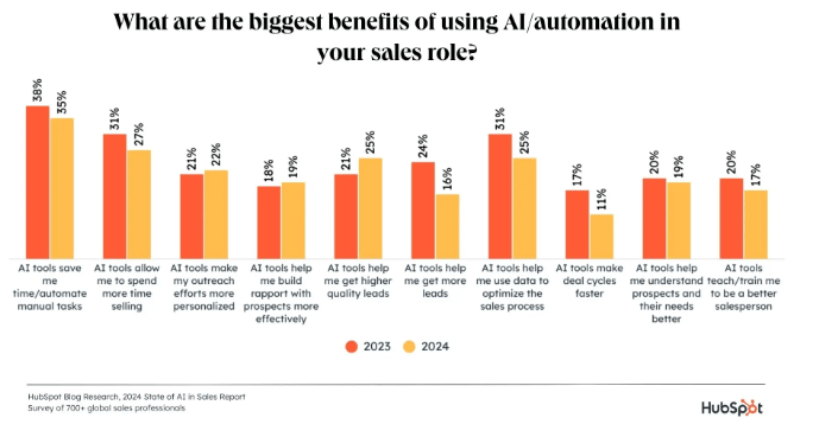Sales leaders are increasingly turning to artificial intelligence (AI) platforms to overcome challenges and boost their operations. According to a recent study by Salesforce, 61% believe that generative AI will help them better serve their customers and sell more efficiently, according to Salesforce research.
84% of sales professionals currently using generative AI report that it has helped increase sales by enhancing and speeding up customer interactions. This real-world success underscores the potential of AI to transform sales processes, particularly in areas like basic content creation (82%), analyzing market data (74%), and automating personalized sales communications (71%).
In the following case studies, we explore how companies across different industries have successfully integrated AI into their sales processes, overcoming challenges and reaping significant rewards.
Table Of Contents
Case Study 1: Takeda Oncology
Takeda Oncology, a global pharmaceutical company, aimed to enhance its sales performance by equipping its team with predictive and AI capabilities. Collaborating with ZS, the company developed an application that analyzed the treatment preferences of individual healthcare providers, rather than relying on market share-based segmentation.
Results:
- Bi-weekly updates with the latest analytics
- Contextually relevant information for personalized customer engagement
- Recommended treatment choices for sales discussions
Case Study 2: ACI Corporation
ACI Corporation, which specializes in government health insurance programs, faced low conversion rates and needed better lead qualification. The company implemented Salesken’s real-time sales agent assistance, an AI tool that integrates with CRM and dialer platforms to analyze customer speech and provide real-time insights.
Results:
- Increased sales conversions from under 5% to 6.5%
- Improved qualified leads from 45.5% to 64.1%
- Product knowledge increased from 24% to 34.6%
Case Study 3: Devoteam Italy
Devoteam Italy, a leading technology consultancy, sought to improve the efficiency of their sales and implementation processes. The company implemented Cubeo AI’s no-code platform, deploying AI Agents to automate routine tasks, provide real-time insights, and improve coordination across teams.
Results:
- 7x faster response times for customer inquiries
- 50% more inquiries handled without increasing team size
- 30% boost in customer satisfaction through faster, personalized service
- Automated service proposals and technical support, reducing deployment delays
Case Study 4: Capgemini
Capgemini, a global technology consulting firm, needed a solution to manage its 39 product lines and 122 offerings while detecting hidden revenue opportunities. The firm adopted Aptivio’s buyer intent AI platform, which provided real-time insights into prospect behavior and integrated with CRM, marketing automation, and digital advertising tools.
Results:
- Increased sales-ready results by 40%
- Boosted high-intent leads by 40%
- Increased marketing-qualified leads by 4.8x
Case Study 5: Rogers Communications
Rogers Communications, a leading telecom company, sought to improve its sales forecasting accuracy and operational efficiency. The company implemented the SalesChoice Insight Engine, an AI-powered tool that integrated predictive insights into Rogers’ core sales metrics and provided 24/7 coaching.
Results:
- 80% sales forecasting accuracy
- 90% accuracy in predicting sales losses early in the sales cycle
- Provided sales teams with qualification checklists to improve proposal quality
The Benefits of Generative AI in Sales
Generative AI is transforming sales by boosting efficiency, enhancing customer engagement, and driving revenue growth.

Here are the key benefits:
Increased Efficiency:
- Automation of Routine Tasks: Generative AI automates tasks like data entry, report generation, and follow-up scheduling, freeing sales teams to focus on closing deals and building relationships.
- Faster Content Creation: AI generates emails, proposals, and presentations quickly, enabling sales reps to engage with more prospects in less time.
Enhanced Customer Engagement:
- Personalized Interactions: AI tailors messages and offers based on customer data, increasing the chances of conversion.
- Real-Time Recommendations: AI provides on-the-spot suggestions during sales calls, improving decision-making and deal closure rates.
Data-Driven Insights:
- Predictive Analytics: AI forecasts sales trends, helping teams adjust strategies and improve accuracy in sales forecasting.
- Market Analysis: AI analyzes market data to identify trends and customer sentiment, giving sales teams a strategic edge.
Higher Productivity:
- Lead Qualification: AI ranks leads by potential, allowing sales teams to focus on the most promising opportunities.
- Streamlined Processes: AI integrates with CRM systems to simplify workflows and reduce bottlenecks.
Scalability:
- Support for Growth: AI scales with business needs, handling larger data volumes and communications without additional headcount.
Empowered Sales Teams:
- Continuous Improvement: AI offers feedback and training, helping sales reps refine their skills and increase effectiveness.
- Reduced Burnout: By automating tedious tasks, AI lessens workload, preventing burnout and keeping teams motivated.
The Risks and Ethical Considerations of Generative AI in Sales
Bias and Fairness:
- Risk of Bias: AI systems can inadvertently perpetuate or amplify existing biases in data, leading to unfair treatment of certain customer groups. This can result in skewed recommendations or discriminatory practices.
- Ethical Responsibility: It’s crucial to regularly audit AI systems for bias and implement strategies to ensure fairness, such as using diverse data sets and transparency in AI decision-making processes.
Data Privacy:
- Customer Data Risks: AI systems require large amounts of data, raising concerns about how customer information is collected, stored, and used. Mishandling data can lead to breaches of privacy and loss of trust.
- Compliance: Businesses must comply with data protection regulations like GDPR, ensuring that AI tools are used responsibly and that customer data is safeguarded.
Transparency:
- Black Box Decisions: AI systems often operate as “black boxes,” where the decision-making process is not easily understood. This lack of transparency can lead to mistrust and difficulty in accountability.
- Ethical Transparency: Companies should strive to make AI operations understandable and provide clear explanations for AI-driven decisions to maintain customer trust.
Job Displacement:
- Automation Risks: While AI can enhance productivity, it also raises concerns about job displacement, particularly for roles heavily reliant on routine tasks that AI can automate.
- Balancing Automation and Human Roles: Companies must balance AI integration with job retention strategies, such as retraining employees for new roles that complement AI capabilities.
Over-Reliance on AI:
- Decision-Making Risks: Relying too heavily on AI can lead to complacency, where human judgment is undervalued. This can be problematic in situations requiring nuanced understanding or ethical considerations.
- Human Oversight: It’s essential to maintain human oversight in AI-driven processes, ensuring that AI complements rather than replaces human decision-making.
Security Concerns:
- Cybersecurity Risks: As AI systems become more integrated into sales processes, they become targets for cyberattacks. Protecting AI systems from breaches is critical to maintaining operational integrity.
- Ethical Use of AI: AI should be deployed with a focus on ethical use, ensuring that it’s used to enhance business operations without compromising security or ethical standards.
Need Help Implementing Generative AI Solutions?
Cubeo AI is here to simplify the adoption of generative AI for your sales team. Our no-code platform allows you to create custom AI Agents and Assistants specifically tailored to your business needs—no programming expertise required. Whether you’re looking to enhance content creation, automate routine tasks, or seamlessly integrate AI into your existing systems, Cubeo AI has the tools you need.
Sign up here to start exploring our platform, and schedule an onboarding call with one of our founders who can provide tailored advice for your specific needs. We’re excited to see what your team can achieve with Cubeo AI!
Related reading:


